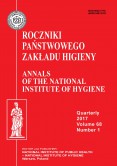Rocz Panstw Zakl Hig 2013, 64(3): 191-196
Studies to determine nutrition behaviour amongst middle school pupils living in the border areas of Poland and the Czech Republic
[Studies to determine nutrition behaviour amongst middle school pupils living in the border areas of Poland and the Czech Republic]
ABSTRACT
Background. In childhood and adolescence, adequate nutrition is vital for ensuring correct physical, mental and emotional development as well as effective learning ability. Thus, the acquiring of such healthy lifestyle behaviour is also important later in adult health.
Objectives. To assess and compare the dietary habits of pupils attending middle school in Poland and the Czech Republic, who live in the border regions between these countries.
Material and methods. The study tool was a nutrition questionnaire dived into a section on socio-economic status and one on detailed dietary habits. Subjects were 202 pupils recruited from Poland and 202 from the Czech Republic. Statistical analyses were performed by the Statistica Ver. 9.0 software, where the Chi2 test was used to evaluate the significance of differences between the data, taking p ≤ 0.5 as the critical value.
Results. There were 47% of pupils eating 4-5 meals daily and 49% and 50% ate breakfast and lunch respectively. Milk or dairy drinks were daily drunk by 24% pupils daily and 14% ate hard or processed cheese. Fish was consumed 1-2 times weekly by 46% subjects and fruit and vegetables were daily eaten by 49% and 36% of pupils respectively.
Conclusions. Pupil’s dietary habits were found to be unfavourable in both countries. There were significant differences between the countries tested, especially in how frequently breakfast and lunch were eaten, as well as in the intakes of milk and dairy products and in the consumption of fast-food and sugary drinks.
STRESZCZENIE
Wprowadzenie. Sposób żywienia w okresie dzieciństwa i młodości determinuje rozwój psychofizyczny i emocjonalny, efektywność w procesie uczenia oraz wpływa na stan zdrowia w życiu dorosłym.
Cel. Celem badań była ocena i porównanie nawyków żywieniowych gimnazjalistów z Polski i Czech.
Materiał i metoda. Materiał do badań stanowiły ankiety badające nawyki żywieniowe. Analizę statystyczną wykonano z wykorzystaniem programu StatSoft, Inc. STATISTICA version 9.0. Do oceny różnic pomiędzy badanymi cechami wykorzystano test niezależności Chi². Za istotny statystycznie przyjęto poziom p ≤ 0,05.
Wyniki. 47% gimnazjalistów spożywało 4-5 posiłków dziennie, 49% spożywało codziennie pierwsze a 50% drugie śniadanie. 24% gimnazjalistów codziennie piło mleko lub napoje mleczne, 14% jadło sery żółte lub topione. 1-2 razy w tygodniu ryby spożywało 46% uczniów. Owoce codziennie spożywało 49% badanych uczniów natomiast warzywa 36% badanych.
Wnioski. Nawyki żywieniowe badanej grupy gimnazjalistów są niekorzystne. Porównanie nawyków żywieniowych gimnazjalistów zamieszkałych w Polsce i w Czechach wykazało występowanie istotnych różnic. Różnice te dotyczyły w szczególności częstości spożycia pierwszego i drugiego śniadania, mleka i przetworów mlecznych oraz posiłków typu fast-food i napojów słodzonych.
Downloads: 2036


